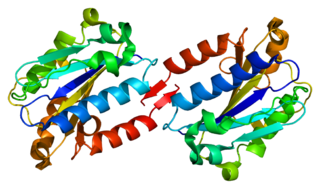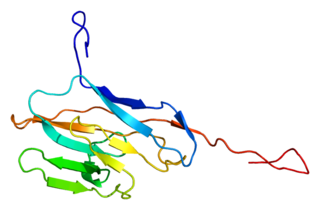G antigen 12F is a protein that in humans is encoded by the GAGE12F gene. [3]
G antigen 12F is a protein that in humans is encoded by the GAGE12F gene. [3]

Integrin, alpha L , also known as ITGAL, is a protein that in humans is encoded by the ITGAL gene. CD11a functions in the immune system. It is involved in cellular adhesion and costimulatory signaling. It is the target of the drug efalizumab.

CD68 is a protein highly expressed by cells in the monocyte lineage, by circulating macrophages, and by tissue macrophages.

Leukocyte surface antigen CD53 is a protein that in humans is encoded by the CD53 gene.

CD63 antigen is a protein that, in humans, is encoded by the CD63 gene. CD63 is mainly associated with membranes of intracellular vesicles, although cell surface expression may be induced.

Krueppel-like factor 1 is a protein that in humans is encoded by the KLF1 gene. The gene for KLF1 is on the human chromosome 19 and on mouse chromosome 8. Krueppel-like factor 1 is a transcription factor that is necessary for the proper maturation of erythroid cells.

T-cell surface glycoprotein CD3 zeta chain also known as T-cell receptor T3 zeta chain or CD247 is a protein that in humans is encoded by the CD247 gene.

T-cell surface glycoprotein CD3 gamma chain is a protein that in humans is encoded by the CD3G gene.

4F2 cell-surface antigen heavy chain is a protein that in humans is encoded by the SLC3A2 gene.

Carcinoembryonic antigen-related cell adhesion molecule 1 (CEACAM1) also known as CD66a, is a human glycoprotein, and a member of the carcinoembryonic antigen (CEA) gene family.

Rh-associated glycoprotein (RHAG) is an ammonia transporter protein that in humans is encoded by the RHAG gene. RHAG has also recently been designated CD241. Mutations in the RHAG gene can cause stomatocytosis.

Tripeptidyl-peptidase 2 is an enzyme that in humans is encoded by the TPP2 gene. Among other things it is heavily implicated in MHC (HLA) class-I processing, as it has both endopeptidase and exopeptidase activity.

T-cell surface glycoprotein CD1e, membrane-associated is a protein that in humans is encoded by the CD1E gene.

Myeloid cell Nuclear Differentiation Antigen is a protein that in humans is encoded as MNDA gene.

Carcinoembryonic antigen-related cell adhesion molecule 8 (CEACAM8) also known as CD66b, is a member of the carcinoembryonic antigen (CEA) gene family. Its main function is cell adhesion, cell migration, and pathogen binding.

Ecto-ADP-ribosyltransferase 4 is an enzyme that in humans is encoded by the ART4 gene. ART4 has also been designated as CD297.

Sperm-associated antigen 1 is a protein that in humans is encoded by the SPAG1 gene.

PHD finger protein 20 is a protein that in humans is encoded by the PHF20 gene.

CD1a is a human protein encoded by the CD1A gene.

CD180 antigen is a protein that in humans is encoded by the CD180 gene.

Myosin IG, also known as myosin 1G and MYO1G, is a protein that in humans is encoded by the MYO1G gene. MYO1G is a member of class I unconventional myosins. Its expression is highly restricted to hematopoietic tissues and cells. It localises exclusively to the plasma membrane and is dependent on both the motor domain and the tail domain. MYO1G regulates cell elasticity possibly by interaction plasma membrane and cortical actin in Jurkat T-cells.